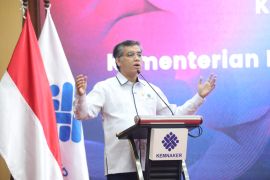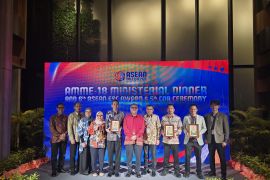MELBOURNE, Australia, Aug. 23 (ANTARA/Medianet International-AsiaNet) --
English proficiency in Indonesia is increasing according to new data from the world’s most popular high stakes English language test, IELTS (the International English Language Testing System).
The results achieved by Indonesia IELTS test takers in 2011 show that proficiency in three of four areas of English language – writing, speaking and listening - has increased since 2010.
The IELTS partners said the results reinforced IELTS as the world’s premier English language test.
“Results from 2011 show Indonesian test takers are committed to English studies and improving their proficiency in the language,†British Council’s Angela Hennelly said.
“More and more people each year in Indonesia are choosing to sit IELTS and increase their global education and employment opportunities. IELTS results can open doors for people to study in the USA, UK or Australia, or obtain a visa to live and work in places such as Canada or Australia,†John Belleville, IDP: IELTS Australia, added.
“We undergo an extensive range of test research and test development so candidates and recognising organisations alike can be confident all results are accurate and reliable. IELTS is designed to encourage test takers to enhance their real world English effectively,†Cambridge ESOL’s Mike Milanovic concluded.
The average IELTS score in Indonesia increased from 6.2 to 6.4 on the IELTS scale from 1 to 9 in 2011.
Listening, writing and speaking all increased with listening identified as the strongest skill among people in Indonesia taking the test in 2011. Data is taken from test takers who sat the IELTS academic test.
There are 31 IELTS test centres located across Indonesia including Bandung, Denpasar, Jakarta, Medan, Semarang and Surabaya.
IELTS test results are requested by more than 7,000 education institutions, governments and employers around the globe to provide accurate and reliable measurement of English language proficiency.
More than 1.7 million IELTS tests were sat in 2011, a 12% increase compared to 2010.
The full analysis of 2011 test data can be viewed at www.ielts.org/researchers.
International English Language Testing System (IELTS)
IELTS is the International English Language Testing System, the world’s most popular high stakes English language test. 7,000 organisations recognise IELTS as a secure, valid and reliable indicator of true to life ability to communicate in English for education, immigration and professional accreditation. IELTS is jointly owned by British Council, IDP: IELTS Australia and the University of Cambridge ESOL Examinations (Cambridge ESOL).
British Council is the UK's international organisation for education and cultural relations. Dedicated to building trust through the exchange of knowledge between people worldwide, the British Council is represented in more than 100 countries.
IDP: IELTS Australia is a subsidiary of IDP Education - owned by the Australian public universities and one of the world’s leading international education organisations, offering student placement in Australia, the USA Canada, New Zealand and the UK. IDP Education has more than 40 years’ experience in international higher education, having placed more than 300,000 students in Australia over the last 25 years.
University of Cambridge ESOL Examinations (Cambridge ESOL) is the world's leading provider of exams for learners of English. Each year the exams are taken by more than three million people, in 135 countries.
About the test
Candidates are tested in listening, reading, writing and speaking. All tests are scored on a banded system from 1 (the lowest) through to 9 (the highest possible band score).
IELTS offers a choice of two versions, to serve both academic and non-academic purposes. IELTS Academic module measures English language proficiency needed for an academic, higher learning environment. The tasks and texts are accessible to all test-takers, irrespective of their subject focus. IELTS General Training module measures English language proficiency in a practical, everyday context. The tasks and texts reflect both workplace and social situations. The General Training module is suitable for immigration purposes to Australia, Canada, New Zealand and the United Kingdom.
A sample of government and professional associations who recognise or require applicants to hold an IELTS test report form include:
* Citizenship and Immigration Canada
* Australian Department of Immigration and Citizenship (DIAC)
* UK Home Office - Border Agency
* New Zealand Immigration Service
* Commission on Graduates of Foreign Nursing Schools and National Council of State Boards of Nursing (NCSBN), USA
* International Monetary Fund
* General Medical Council (GMC) - UK
* Nursing and Midwifery Council (NMC) - UK
For further information or interviews, please contact:
Arj Ganeshalingam
Porter Novelli
Phone: +61 3 9289 9555
Mobile: +61 421 690 204
Email: aganeshalingam@porternovelli.com.au
Nicole Hamilton
Porter Novelli
Phone: +61 3 9289 9555
Mobile: +61 419 316 621
Email: nhamilton@porternovelli.com.au
SOURCE: IELTS
Editor: PR Wire
Copyright © ANTARA 2012











